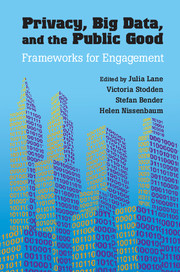Book contents
- Frontmatter
- Dedication
- Contents
- Contributors
- Editors’ Introduction
- Part I Conceptual Framework
- Part II Practical Framework
- 6 The Value of Big Data for Urban Science
- 7 Data for the Public Good: Challenges and Barriers in the Context of Cities
- 8 A European Perspective on Research and Big Data Analysis
- 9 The New Deal on Data: A Framework for Institutional Controls
- 10 Engineered Controls for Dealing with Big Data
- 11 Portable Approaches to Informed Consent and Open Data
- Part III Statistical Framework
- References
7 - Data for the Public Good: Challenges and Barriers in the Context of Cities
Published online by Cambridge University Press: 05 July 2014
- Frontmatter
- Dedication
- Contents
- Contributors
- Editors’ Introduction
- Part I Conceptual Framework
- Part II Practical Framework
- 6 The Value of Big Data for Urban Science
- 7 Data for the Public Good: Challenges and Barriers in the Context of Cities
- 8 A European Perspective on Research and Big Data Analysis
- 9 The New Deal on Data: A Framework for Institutional Controls
- 10 Engineered Controls for Dealing with Big Data
- 11 Portable Approaches to Informed Consent and Open Data
- Part III Statistical Framework
- References
Summary
Introduction
Comprehensive, high-quality, multidimensional data has the potential to improve the services cities provide, as it does with the best private service-providing businesses. City officials, politicians, and stakeholders require data to (1) inform decisions that demonstrate service effectiveness, (2) determine which services should be targeted in a geographic area, and (3) utilize limited resources to best serve residents and businesses.
Administrative data is now ubiquitous in government agencies concerned with health, education, social services, criminal justice, and employment. Local government has primarily used this data to count cases and support budget making within the programs for which the data is collected. Yet data linked across programs, where individuals and families can be tracked with multiple data sources either cross-sectionally or longitudinally, is rare. Both data scientists and the public sector currently have an excellent opportunity to use the big data of government to improve the quality and quantity of analyses to improve service delivery. This chapter describes an effort in one place to use the administrative data collected in the public sector to have an impact by informing city leadership.
- Type
- Chapter
- Information
- Privacy, Big Data, and the Public GoodFrameworks for Engagement, pp. 153 - 172Publisher: Cambridge University PressPrint publication year: 2014
References
- 1
- Cited by



